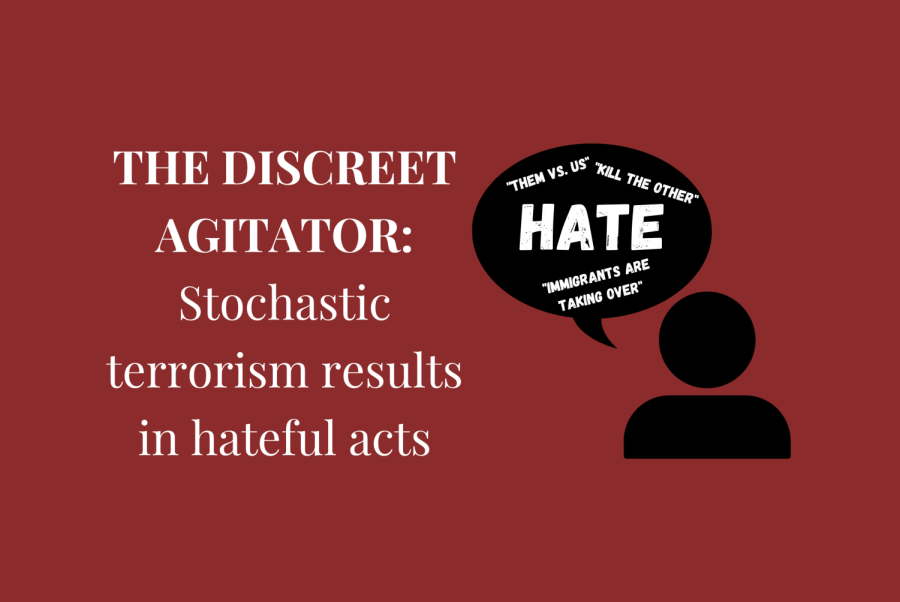The Discreet Agitator: Stochastic terrorism results in hateful acts
May 22, 2023
This previously ran in our April 2023 print issue.
How does one incite violence without directly advocating for it? The answer: stochastic terrorism.
When we break down this term, the word stochastic implies a sense of randomness that cannot be specifically determined; and terrorism, as defined by Merriam-Webster is “violence motivated by ideology.”
When we combine these terms, it means the incitement of individuals through the use of language that perpetuates fear — resulting in violent acts which are statistically probable but occur randomly. But why does this term matter? Well, without the direct call for violence, rhetoric can become cryptic and easy to obfuscate. Messaging that directs hate towards marginalized groups, (especially in America), has accelerated within the past few years, championed by a minority of anti-establishment mouthpieces seeking to dismantle the social fabric of America.
The rise of social media platforms exhibits the potential to exacerbate the spread of stochastic terrorism. For example, on March 15, 2019, in Christchurch, New Zealand, a lone gunman carried out an attack on two mosques to “show the invaders that our lands will never be their lands, our homelands are our own and that, as long as a white man still lives, they will NEVER conquer our lands,” according to his manifesto.
The shooter live-streamed the terroristic act on Facebook in hopes of inspiring others to commit copycat attacks. He was known to be active on a plethora of online forums that echo the idea of the Great Replacement Theory, the idea that global elites are using foreigners to replace the white race.
He was radicalized and financially supported influencers like Lauren Southern, who said
in 2018 in her “The Great Replacement” Youtube video, “Immigrants who come to the West are not looking to assimilate, they’re looking to take over.” Imagine if someone wanted to take something away from you, how would you respond? Would you let them have their way?
Aug. 3, 2019: on the border town of El Paso, Texas, a 21-year-old man equipped with an AK-style gun entered a Walmart with the intent to kill in an act of far-right extremism. He specifically targeted Latinos, killing 23 people. His rationale: defending America against the supposed “Hispanic invasion of Texas.” He openly expressed his “support [for] the Christchurch shooter and his manifesto” and echoed similar terms in his manifesto like invaders and believed that he was “defending [his] country from cultural and ethnic replacement brought on by an invasion.”
His motive, like the Christchurch shooter, was built upon the Great Replacement Theory, primarily in the context of America — where the Democratic Party is purposely letting copious amounts of Latino immigrants, (who tend to support the Democratic Party), in order to win elections. He demonstrated this in his manifesto posted to 8chan: “They intend to use open borders, free healthcare for illegals, citizenship and more to enact a political coup by importing and then legalizing millions of new voters.”
The Great Replacement Theory is based off of populist far-right views promoted by political pundits, including figures like Nick Fuentes — figurehead of the white nationalist group Groypers and host of the America First Political Action Conference, previously Tweeted in 2021, “If you are a white male zoomer, remember that the people in power hate you and your unborn children and they will try to genocide you in your lifetime.” Here, he uses inflammatory language to pit his audience against the people in power and how they hate the white race to the point where they will get genocided. By fearmongering his audience he spurs them to consider drastic measures in order to preserve their race and to avoid genocide.
Although domestic extremist activities that are affected by stochastic terrorism in the US are disproportionately committed by right-wing extremist; this doesn’t impune left-wing extremists. One such example can be seen with Charles Landeros in Eugene, Oregon. Landeros — an Army veteran, created a firearm training group for the LGBTQ community and people of color as a response to white nationalist attacks. Known for commonly expressing anti-police sentiments on social media with posts like “Death to all pigs.” They attempted to use a gun during a custody dispute with Eugene police officers over the custody of their daughter — resulting in Landeros’s death. When people spew hatred concerning police officers because of things like systemic racism and constantly categorize cops like they’re all awful people, even if that isn’t their intended meaning. They still engage in a similar level of stochastic terrorism as those on the right — resulting in distrust with law enforcement agencies and fostering a hostile attitude towards them.
In corners of the internet, where hate festers, people echo these malicious messages on these sites — such as Stormfront, 8chan, and The Daily Stormer — where their behavior is encouraged and fostered. Alas, with the polarization of politics and the amplification of social media, there are more issues that plague American society and are rooted deeply in the core of America that raise the threat of stochastic terrorism. The question proposed is “how do we address those who may be inclined to commit violence by stochastic terrorism?” There are some solutions like improving digital literacy, mental health support, and holding figures who incite violence accountable. But above all, nobody, absolutely no one, deserves to be dehumanized or killed based upon their identity.











